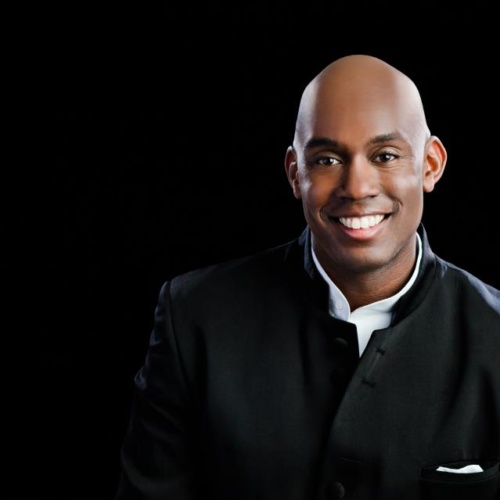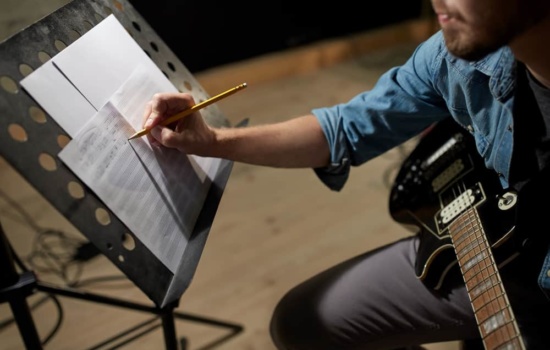Music Career Finder
Start Here:
Conductor

How To Become a Conductor
- A Music Conductor directs a group of musicians in an orchestra on how to play their parts
- A Conductor typically works with orchestras, at opera companies, for schools and universities, and in recording studios
- Working as a conductor may involve long hours and/or taking your work home with you
- You will need to earn a bachelor’s degree in music and possibly a master’s degree too
- The average salary for Conductors is about $49,400 per year
- Career Description
- Salary
- Career Outlook
- Career Path
- Experience & Skills
- Education & Training
- Additional Resources
- Sources
- References
Career Description
A conductor leads an orchestra, opera, or other musical ensemble through visible gestures and even facial expressions.
Their role is to help all of the players keep time and encourage them to play with certain emotions.
What Does a Music Conductor Do?
A music conductor is crucial to the success of an orchestra performing well. Here are their main responsibilities:
- Interpreting the Score: They analyze the music to understand its nuances, dynamics, and emotional depth, deciding how to convey these elements to the ensemble.
- Rehearsing: They run rehearsals, making sure the orchestra plays cohesively and impactfully.
- Controlling ebbs and flows: They use gestures, facial expressions, and body language to indicate the ebbs and flows of the piece of music (ex. horns get quieter here, violions play passionately there, everyone plays louder here, etc.)
- Keeping tempo: Part of the reason a conductor waves their hands and arms in the air is to show the players how fast or slow to play their parts.
- Real-time guidance: The conductor is the only one with the score, which has every player’s part, so they are in charge of guiding the players through the piece of music.
A Day In the Life of a Music Conductor
A conductor spends their days studying scores, rehearsing, and meeting with anyone involved in putting on an orchestra performance.
Joseph Young, Atlanta Symphony Orchestra Assistant Conductor and Youth Orchestra Music Director, said he spends most of his time “studying scores, getting to know the music, and falling in love with the music before rehearsals.”
Salary
The average annual salary for conductors is approximately $49,400. The salary range for conductors runs from $25,000 to $148,000
Where Does a Music Conductor Work?
There are many places a music conductor can work, and they could be a salaried employee or work as a freelancer. So their day-to-day will look different depending on the context.
The most common places a conductor works include:
- Orchestras
- Opera companies
- Conducting pit orchestras for stage productions
- Schools and universities
- Recording studios
How Do Conductors Make Money?
As an Assistant Conductor of an orchestra, Young is salaried, and having the title of conductor gives him more security. But if he works overseas or with other groups, it involves project-to-project payments as a freelancer.
For part-time freelance conductors, the average yearly income is considerably lower than the income of a star conductor at a top orchestra, which can top $1.5 million yearly. Young said having a manager can help you negotiate better rates as a freelancer.
Hey, what do you think about trying our new Music Career HelperMusic Career Helper really quick? It’s totally free and could help get your career moving fast! Give it a try. It’s totally free and you have nothing to lose.
Career Outlook
A music conductor’s work is never done, according to Young. He said it’s an “all day” job.
Even when he’s not on stage with the orchestra and has gone home for the day, he’s looking at a score in his home office or apartment.
“I’m still working,” he said. “I have to get things done.”
When at the concert hall, conductors work with musicians, stagehands, the stage manager, the music director, artistic director, and the executive director of the ensemble to refine the performance.
Career Path
There are many ways to become a music conductor, but every conductor needs to know how to read and write sheet music. So it’s important to learn how to do that as well as learning music theory.
Young started his career by teaching high school music for three years after earning a degree in music education. After getting some practical experience, his next step was to start taking conducting workshops, which is where conductors can work with master conductors and full orchestras and get career advice.
After earning at least a bachelor’s degree in music (more on required education below), here’s how to get started as a conductor…
Listen To Orchestral Music
“Listen to as much orchestral music as you can, so you are falling in love with the music,” Young said.
Pretend
Practice conducting while you listen to a piece of music. Young said you should “pour your heart out and pretend” you’re conducting.
Film Yourself
Young also suggests filming yourself as you pretend to conduct. Then study the playback, making note of what you did well and how you can improve.
Attend Rehearsals
Go to as many rehearsals as you can, just to watch. You’ll get a very good idea of what a professional conductor does.
Take Conducting Workshops
A conductor’s workshop is an educational program aimed at helping aspiring conductors develop their skills through hands-on training and mentorship.
Usually, these workshops feature masterclasses led by experienced conductors. In the workshop, they focus on specific techniques, repertoire, and conducting styles.
Then the participants get the chance to conduct ensembles during rehearsals, getting valuable feedback from the teacher.
Apply To Any/All Conductor Positions
Young said to be open to all kinds of conductor positions, like at universities, youth orchestras, symphonies, and assistant conductor jobs.
“Take workshops, find a mentor, and start applying for open positions,” he said.
Advancement as a Conductor
Here’s the order in which you would typically advance as a music conductor:
- Orchestra musician
- Assistant Conductor
- Associate Conductor
- Conductor, Music Director, or Artistic Director
- Executive Director (less conducting, more administration)
Experience & Skills
If you’re serious about becoming a music conductor, here are the skills you’ll need to develop in order to succeed…
Music Theory
In order to lead a large group of well-educated professional musicians, you must be proficient in music theory. You can’t lead people through a piece of music without understanding it fully.
Reading and Writing Sheet Music
Being a conductor is all about reading sheet music. You need to know how to read it so you can interpret it and then lead the players on how to follow it and play the music.
Play an Instrument
You need to know how to do a thing before you guide others on how to do it. Young said you need to “play an instrument well before stepping on the podium to give advice to advanced players.”
Leadership
An aspiring conductor also has to “understand group dynamics and group psychology,” Young said. You’re working with many different people all with different personalities. Because of this, conducting workshop experience is one of the most important experiences for an aspiring conductor.
Good Performer
“Our instrument is the orchestra,” Young said. So you need to be comfortable playing your “instrument” in front of an audience.
Be Okay With Feeling Uncomfortable
It may feel strange to conduct for the first time, but that’s just because you may not be used to it. Young said you need to “not be afraid to be extroverted” because a conductor has to “go outside of their comfort zone a lot.”
Education & Training
You will need to earn a bachelor’s degree in music to succeed as a music conductor, and you may need a master’s degree too.
Music Conductor Degree
A bachelor’s degree (BA) in music theory, music composition, or conducting music is essential, although a master’s (MA) in a similar field is usually preferred.
Young says his degree in music education “gave me a little bit more knowledge of how the other instruments work and it gave me an opportunity to work with kids because a lot of the stuff I did early in my career was with kids.”
Learn an Instrument
“You have to play one instrument very well,” Young said.
Why? Because if you’re talking to some of the world’s most talented musicians, you have to be sure you can explain what you need and know what you’re talking about.
Learn Another Language
This one may surprise you, but Young suggests learning a language often used in orchestral music, like German or Italian. Language skills help the conductor understand the spirit of the piece, and what’s required of the musicians.
“I was an Assistant Conductor on an opera in Czech so I had to figure out how those words work,” he said.
Additional Resources
The Conductors Guild has a lot of resources for the aspiring conductor, including workshops. “Almost every conductor is in that,” Young says. The League of American Orchestras can also be helpful.
Sources

Joseph Young
Joseph Young is the Music Director of the Berkeley Symphony. He has previously served as the Assistant Conductor and Youth Orchestra Music Director of the Atlanta Symphony Orchestra.
He has also worked with the Phoenix Symphony, San Francisco Conservatory of Music, Colorado Symphony Orchestra, Tucson Symphony, Charleston Symphony Orchestra, Buffalo Philharmonic, Delaware Symphony Orchestra, and Orquestra Sinfónica do Porto Casa da Música.
Considered one of America’s most promising young conductors, Young was featured in the League of American Orchestras’ prestigious Bruno Walter National Conductor Preview, was the first recipient of the Sir Georg Solti Foundation Career Grant for young conductors and the first recipient of the Baltimore Symphony Orchestra-Peabody Conducting Fellowship, and was one of five recipients of the League of American Orchestras’ highly regarded American Conducting Fellowship. He graduated with a bachelor’s degree in music education from the University of South Carolina and did graduate work in conducting with Gustav Meier and Markand Thakar at the Peabody Conservatory, where he currently serves as the Ruth Blaustein Rosenberg Artistic Director of Ensembles, Assistant Professor and Chair (Conducting Ensembles). He is represented by William Reinert Associates.
Young has been profiled by the San Francisco Classical Voice, Berkeleyside, Bmore Art, Town Carolina, San Francisco Examiner, The Violin Channel, Broadway World, Arts ATL, Q City Metro, Post & Courier, WABE, Datebook podcast, KQED, Mercury News, Baltimore Sun, The Phoenix Symphony YouTube channel, and the League of American Orchestras’ The Hub blog.
References
- 1Multiple. "Average Conductor, Orchestra Salary". PayScale. published: Jul 20, 2019. retrieved on: Dec 16, 2019




